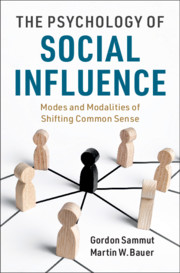Book contents
- The Psychology of Social Influence
- The Psychology of Social Influence
- Copyright page
- Dedication
- Contents
- Figures
- Tables
- Boxes
- Foreword 1
- Foreword 2
- Acknowledgements
- Chapter 1 Modalities of Social Influence
- Part I Recurrent Sources of Populism
- Chapter 2 Crowding
- Chapter 3 Leading
- Part II Experimental Paradigms
- Part III Necessary Extensions
- Part IV Theoretical Integration
- References
- Index
Chapter 3 - Leading
Directors, Dictators and Dudes
from Part I - Recurrent Sources of Populism
Published online by Cambridge University Press: 19 December 2020
- The Psychology of Social Influence
- The Psychology of Social Influence
- Copyright page
- Dedication
- Contents
- Figures
- Tables
- Boxes
- Foreword 1
- Foreword 2
- Acknowledgements
- Chapter 1 Modalities of Social Influence
- Part I Recurrent Sources of Populism
- Chapter 2 Crowding
- Chapter 3 Leading
- Part II Experimental Paradigms
- Part III Necessary Extensions
- Part IV Theoretical Integration
- References
- Index
Summary
Chapter 3 reviews leadership as a modality of social influence. It starts by reviewing the personality approach to leadership that has predominated in psychological research over the years. This approach focusses on the identification of personality traits, such as charisma, performed in the crowd situation; a trait that successful leaders have acquired in an unclear way. This is juxtaposed by the situational approach to leadership; effective leadership is contingent on particular situations which variably call for different matching traits. Both theories are critiqued in light of normative models of leadership which account for the sticky resilience of dictatorships in various countries around the world even in the face of opportunities for instituting or restituting democracy. The chapter closes withthe social identity approach to leadership and paternalism, arguing that effective leadership is contingent on the interplay between leaders and the consent of followers.
Keywords
- Type
- Chapter
- Information
- The Psychology of Social InfluenceModes and Modalities of Shifting Common Sense, pp. 51 - 74Publisher: Cambridge University PressPrint publication year: 2021

